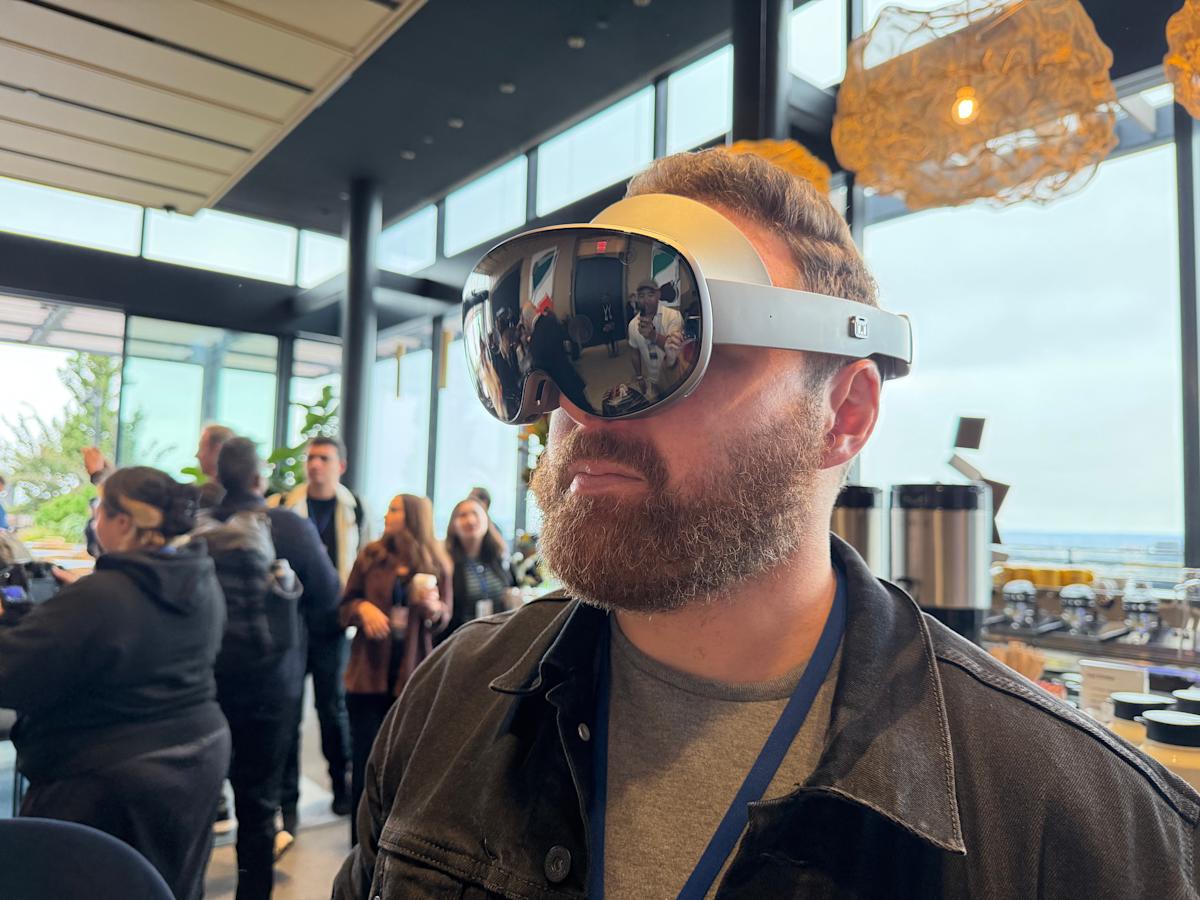Samsung (005930.KS) and Google (GOOG, GOOGL) are taking aim at Meta (META) and the smart glasses market with the release of their new Android XR operating system. Co-developed with partner Qualcomm (QCOM), Android XR is designed to power devices ranging from extended reality headsets to what the companies call AI glasses: smart glasses packed with Google’s Gemini AI assistant.
First up, Samsung’s new Galaxy XR mixed reality headset. Available starting today for $1,799, the Galaxy XR is similar to Apple’s (AAPL) Vision Pro and Meta’s Quest 3 in that it fully covers your field of view, but provides passthrough vision via its built-in external cameras.
Like the Vision Pro, it also includes internal eye-tracking cameras for navigation. External cameras and sensors also track your hand movements, allowing you to navigate the interface by pinching to grab various virtual windows and apps.
Though the Galaxy XR’s hardware hews closely to Apple’s and Meta’s headsets, Samsung and Google are banking on their Android XR and Google’s Gemini to be key differentiators for their device.
But getting Samsung, Google, and Qualcomm to work together wasn’t straightforward at first, said Won-Joon Choi, COO of Samsung’s mobile experience business.
“Initially, it was not easy at all,” Choi told Yahoo Finance, explaining the challenges of working across three companies to develop the hardware and software for the headset.
“I know people may ask, ‘Why are you guys entering this space … while the other companies are not doing well?’” Choi said. “We believe the answer is that when you combine this XR with [Gemini’s] multimodal AI, we kind of saw the synergy between the two.”
With Gemini, you can ask the Galaxy XR questions about what you’re looking at, either in real life via passthrough or in onscreen windows. In one demo, a Samsung representative pulled up Google Maps, then asked Gemini to show them pizza joints in a particular area. The headset then found the highest-reviewed one and listed information about it.
In another, a Google representative wearing a headset asked Gemini about a pair of glasses the Samsung representative was holding. The headset, using passthrough, analyzed the glasses and found that they were from Gentle Monster, quickly pulling up the brand’s website.
Samsung and Google aren’t the only ones offering AI in their headsets, though. Meta uses its Meta AI in its Quest 3 and Apple’s Vision Pro will also presumably get the company’s AI-powered Siri when the software hits the market.
Headsets the Galaxy XR aren’t massive volume sellers, either. According to CounterPoint Research, Meta, which is the market leader, saw shipments of its headsets decline 11% quarter over quarter in Q2 to 710,000 units.
Samsung (005930.KS) and Google (GOOG, GOOGL) are taking aim at Meta (META) and the smart glasses market with the release of their new Android XR operating system. Co-developed with partner Qualcomm (QCOM), Android XR is designed to power devices ranging from extended reality headsets to what the companies call AI glasses: smart glasses packed with Google’s Gemini AI assistant.
First up, Samsung’s new Galaxy XR mixed reality headset. Available starting today for $1,799, the Galaxy XR is similar to Apple’s (AAPL) Vision Pro and Meta’s Quest 3 in that it fully covers your field of view, but provides passthrough vision via its built-in external cameras.
Like the Vision Pro, it also includes internal eye-tracking cameras for navigation. External cameras and sensors also track your hand movements, allowing you to navigate the interface by pinching to grab various virtual windows and apps.
Though the Galaxy XR’s hardware hews closely to Apple’s and Meta’s headsets, Samsung and Google are banking on their Android XR and Google’s Gemini to be key differentiators for their device.
But getting Samsung, Google, and Qualcomm to work together wasn’t straightforward at first, said Won-Joon Choi, COO of Samsung’s mobile experience business.
“Initially, it was not easy at all,” Choi told Yahoo Finance, explaining the challenges of working across three companies to develop the hardware and software for the headset.
“I know people may ask, ‘Why are you guys entering this space … while the other companies are not doing well?’” Choi said. “We believe the answer is that when you combine this XR with [Gemini’s] multimodal AI, we kind of saw the synergy between the two.”
With Gemini, you can ask the Galaxy XR questions about what you’re looking at, either in real life via passthrough or in onscreen windows. In one demo, a Samsung representative pulled up Google Maps, then asked Gemini to show them pizza joints in a particular area. The headset then found the highest-reviewed one and listed information about it.
In another, a Google representative wearing a headset asked Gemini about a pair of glasses the Samsung representative was holding. The headset, using passthrough, analyzed the glasses and found that they were from Gentle Monster, quickly pulling up the brand’s website.
Samsung and Google aren’t the only ones offering AI in their headsets, though. Meta uses its Meta AI in its Quest 3 and Apple’s Vision Pro will also presumably get the company’s AI-powered Siri when the software hits the market.
Headsets the Galaxy XR aren’t massive volume sellers, either. According to CounterPoint Research, Meta, which is the market leader, saw shipments of its headsets decline 11% quarter over quarter in Q2 to 710,000 units.











Leave feedback about this